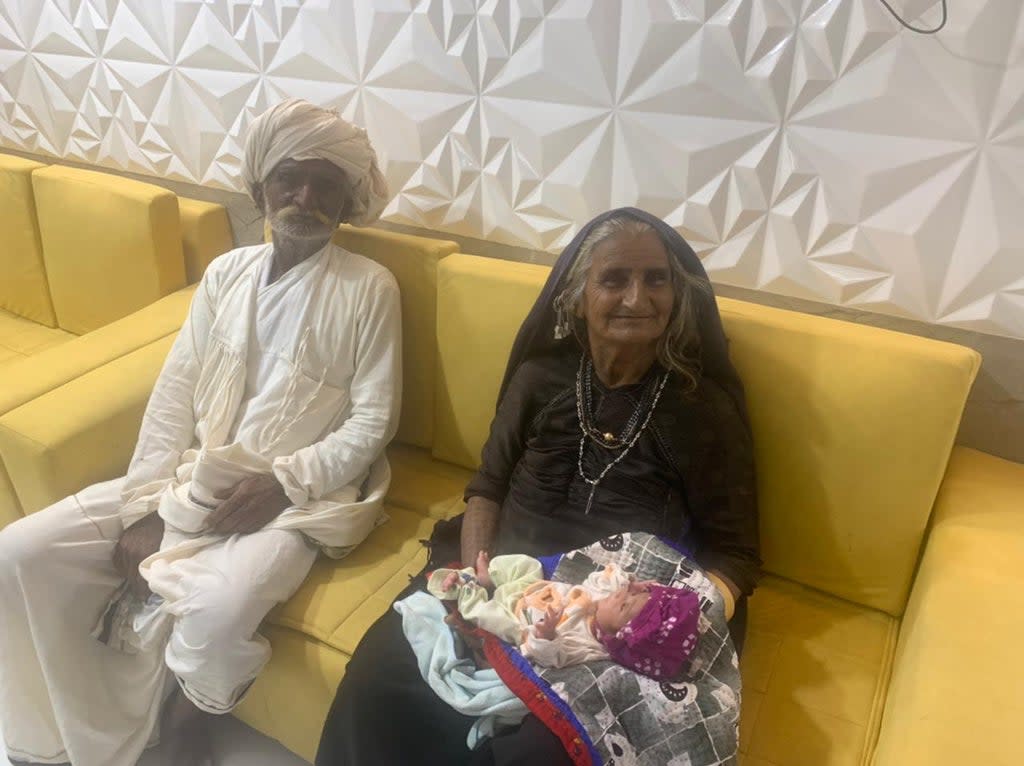‘Call it a miracle’: Woman believed to be 70 years old gives birth to her first child in India

A woman who is believed to be around 70 years old has successfully given birth to her first child through a “miracle” IVF procedure in western India.
Dr Naresh Bhanushali, a gynaecologist from the town of Bhuj in Gujarat state, told The Independent that he had successfully conducted the procedure on Jivuben Vallabhai Rabari and delivered her baby boy on 9 September.
“This is a rare case, you can call it a miracle. I have been practising for 20 years and conducted over 1,000 IVF treatments but I have never seen a case like this. While we are happy that the case was successful, we still urge people to not attempt pregnancies in old age,” said Dr Bhanushali.
Hospital admission records, seen by The Independent, did not list a date of birth for Ms Rabari as she does not possess any documents to prove her age such as a voter ID or birth certificate – a common issue in rural India. However, doctors said she stated her age as around 70.
A milk farmer from the village of Rapar, located about 100km from Bhuj, Ms Rabari urged doctors to look beyond her age and try the treatment as she was so desperate to have a child.
“I told her that she is too old and this is too dangerous for your health, but she would not listen. She ultimately started crying and said ‘Even if I die, I will be happy that at least I tried to have a child’,” said Dr Bhanushali, who oversaw the procedure at Bhuj’s Harsh IVF Centre & Bhanushali Nursing Home.
Dr Bhanushali said Ms Rabari had first approached him about one and a half years ago after four members of her family successfully conceived through IVF treatments conducted by him.
“I explained that those family members were all between 45-50 years old so IVF treatment was possible. I tried to give her negative counselling, explaining the risks that she may even lose her life, but she was so emotional that I eventually gave in,” he said.
To conduct the procedure, doctors first enlarged her uterus and gave her hormone treatments to start menstruation, as Ms Rabari had been post-menopausal for over 20 years. Then doctors transferred a single embryo using IVF.
“In routine IVF treatments we transfer multiple embryos but in her case we transferred only one as her uterus would not be able to handle more,” Dr Bhanushali said.
Blood tests conducted 15 days later revealed that she had successfully conceived.
“The baby developed properly without any anomalies. But in the eighth month, her blood pressure was high, and we decided to deliver the child one month early,” said Dr Bhanushali.
Both the procedure and post-operative care went smoothly, without any complications. The baby boy, named Laalo, was kept in NICU for 15 days, after which both mother and child were allowed to go home.
“We were concerned about what would happen to the baby if Ms Rabari dies. But her family members, and several members of her village came and assured me that they would take care of the child if anything happened to the patient,” said Dr Bhanushali.
Doctors said that while they had taken utmost care to monitor her haemoglobin, and critical care specialists including cardiologists were brought in to ensure no complications arose, the successful birth remains an exception.
“Though we took utmost care, I have to say that she was lucky and we were lucky that the procedure was successful,” he said.


